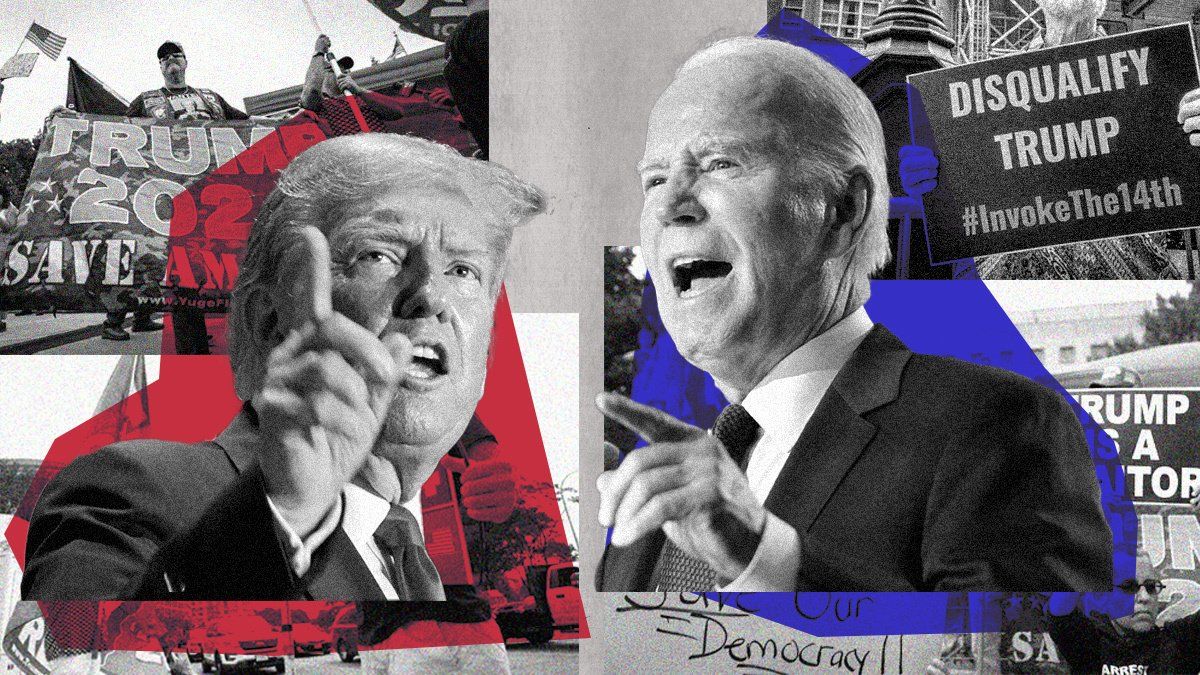In the traffic jam of elections that is 2024 – there are over 50 this year worldwide – the US is still the BelAZ 75710 mega hauler of elections, the biggest rig that carries more payload than any other on the political road. So when it tips over, it’s impossible to ignore. Everything matters about the US 2024 election, and we have to stay within the nonpartisan lines to avoid veering off-road.
So after Donald Trump gave a fiery speech in Ohio last weekend about an impending “bloodbath” if he’s not elected, it’s worth sorting through the carnage of coverage to see what he meant. “Now, if I don’t get elected, it’s going to be a bloodbath for the whole…” he said. “That’s going to be the least of it, it’s going to be a bloodbath for the country. That’ll be the least of it.”
Did he mean another civil war, as some thought? Or, more plausibly and as his campaign has claimed, did he say it in the context of the auto industry and his concerns about high tariffs from China and Mexico?
That matters. Still, even the most charitable interpretation of Trump’s remarks – and I do think he was referring to the auto industry – doesn’t mean he wasn’t also playing footsie with apocalyptic, blood-soaked rhetoric, as he has long done. Warning people about illegal immigrants “poisoning the bloodstream" of the nation and openly talking about being a “dictator” are now standard parts of his campaign playbook.
The bigger problem is that the fallout obscured a much less difficult-to-interpret and more important moment in Trump's speech in which he openly rebranded the insurrectionists of Jan. 6, 2021, as “patriots” and those who went to prison after fair trials as “hostages.” It’s as if Jan. 6 is some 1979 redux of the Iranian hostage crisis and not a deadly attempt to overturn a free and fair US election. “You see the spirit from the hostages, and that's what they are, is hostages,” he said, adding: “And we’re going to be working on that as soon as the first day we get into office. We’re going to save our country, and we’re going to work with the people to treat those unbelievable patriots.”
The point is that this election is already overturning political norms in ways we have never seen in the US. There are other dynamics worth examining as well. Are Joe Biden and the Democrats radically shifting their support not only away from just the Netanyahu government’s wartime policy, but from Israel in general? What could that mean over the long term in the Middle East? What about getting more support for Ukraine? Or, as Ian Bremmer wrote for GZERO yesterday, how will America's new role as a fossil fuel superpower under a Democratic president play out politically and from a climate change perspective?
These are the core election questions this year. Is the US on the precipice of making fundamental changes to its role in the world and to its core democratic values? In her peerless book, “These Truths,” historian Jill Lepore surveys US history and asks whether the country has always lived up to its foundational values. It is the most important modern history book about the US, and its core thesis is playing out in real-time in the 2024 election.
This is a historic moment of testing that merits deeper coverage. That’s why we at GZERO are boosting our coverage of the US election and its impact on global politics.
First, check out our Election Watch section on the website, where we will aggregate our US and global elections coverage so you can get a clearer picture of what’s happening and what it means.
From April, we will also be changing our weekly video series with Eurasia Group’s Managing Director and lead Washington analyst Jon Lieber to “US Politics: Election 2024” and combining that with the weekly series “3 Big Things to Watch in the Election.”
We will also be continuing to track disinformation and the impact it has on the election as we did last month with the death of Alexei Navalny.
This weekend, on our weekly PBS TV program “GZERO World,” Ian Bremmer dives into the impact US foreign policy may have on the 2024 presidential election. The big question: Would a Trump second term bring considerable change to the way the US does business abroad? Ian’s guest this week, Harvard Kennedy School professor and acclaimed political scientist Stephen Walt, says it probably won’t. Ian disagrees. Tune in for a great debate.
It’s the first of several episodes Ian will devote to covering the US election and America’s impact on the world over the coming critical months.
So, get ready for more coverage and what we do best: more insight into what it means, why it matters, and where we are all headed. Let us know what else you want to see us cover.
